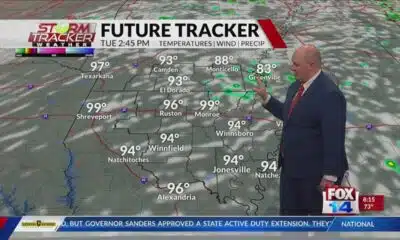News from the South - West Virginia News Feed
Health care would be slashed even for immigrants with legal status under massive Senate bill
by Tim Henderson, West Virginia Watch
July 3, 2025
Provisions in the new tax and spending bill passed by the U.S. Senate early Tuesday would go even further than the House bill in removing health care and other benefits from immigrants with legal status.
The House version of the massive tax and spending bill penalized states providing health care for some immigrants with legal status as well as those that chose to spend state money to enroll immigrants without legal status in Medicaid.
But the Senate bill is even tougher on immigrants here legally and illegally, reducing benefits for most refugees and immigrants on humanitarian parole, including Afghans and Ukrainians who helped the United States in wars overseas and in return were promised safe haven and a safety net in the United States.
The Senate bill also cuts state reimbursement for emergency care in the states that expanded Medicaid under the Affordable Care Act. That would force those states to pay more for emergency care for immigrants, cut back services or drop out of Medicaid expansion, a potentially catastrophic move for low-income U.S. citizens as well as new immigrants.
The bill passed with three dissenting Republican votes, from U.S. Sens. Rand Paul of Kentucky, Susan Collins of Maine and Thom Tillis of North Carolina. Vice President JD Vance broke the tie. The bill, officially the “One Big Beautiful Bill Act,” now returns to the House for final passage before going to President Donald Trump to be signed.
Advocates and experts see repercussions as refugees and other legal immigrants lose health insurance and turn to already-stressed hospitals and charities for help. It could be a nail in the coffin for some rural hospitals that are in financial trouble and scaling back services. Hospitals are required to serve anyone who arrives for emergency care, regardless of their ability to pay.
“In our state, it’s going to be absolutely devastating for rural hospitals,” said Kate Woomer-Deters, a senior attorney at the North Carolina Justice Center’s Immigrant & Refugee Rights Project. “Refugees are not going to go home just because they lost their health care coverage. They’re still going to be showing up at the door of hospitals and clinics needing care.”
Some groups, such as Afghans, Ukrainians and Iraqis, were often brought here after helping the U.S. in war efforts, putting their lives in danger and making life in their home country untenable.
“In the case of the Afghans, this is pretty much a knife in the back to those folks who helped the United States when the United States needed help in their country,” said David Meyer, a board member of the Bloomington Refugee Support Network in Indiana, where he personally helps seven refugee families from Afghanistan, Honduras, Iraq, Nicaragua and Syria.
The Senate bill takes Medicaid, the Affordable Care Act and even food stamps off the table for most refugees. There are a few narrow exceptions for people with green cards, some Cuban migrants waiting for citizenship, and some Micronesians and Marshall Islands natives with treaty rights, said Shelby Gonzales, vice president for immigration policy at the progressive Center on Budget and Policy Priorities.
That also applies to immigrants with legal status who don’t have green cards: people with asylum, immigrant victims of domestic violence, immigrant victims of sex trafficking and parolees — such as Afghans — admitted due to urgent humanitarian reasons, as well as to refugees.
It’s not going to help hospitals. It’s not going to help individuals. It’s not going to help states. There’s going to be some cost-eating by all of them.
– Shelby Gonzales, Center on Budget and Policy Priorities
“There’s going to be more emergency health care needs because uninsured people will be delaying care,” Gonzales said. “It’s not going to help hospitals. It’s not going to help individuals. It’s not going to help states. There’s going to be some cost-eating by all of them.”
The bill also cuts funding for expansion states to pay for emergency care in hospitals. Increased costs could force some states to drop Medicaid expansion altogether, spreading the pain to low-income U.S. citizens as well, Gonzales said.
“It’s one more reason states are looking at their budgets and they’re having to make decisions about their Medicaid expansion program,” Gonzales said.
In Indiana, Meyer said, Afghan women especially often need food stamps, formally known as the Supplemental Nutrition Assistance Program, to get by at first. It takes them a long time to learn to read and write since they were not allowed to attend any school under the Taliban.
“They arrived in our community totally illiterate in their native language and starting from scratch learning English, so that’s a huge impediment to being gainfully employed,” Meyer said. Even once they’ve become self-sufficient enough to get off food stamps and Medicaid, many still need the support of the Affordable Care Act to get health care.
Removing all subsidized health care “would have a devastating effect on those families, and not just Afghans but Syrians, people from the Democratic Republic of Congo and others that have been relocated to south-central Indiana,” Meyer said.
Indiana hosted more than 10,500 of the nearly 460,000 refugees who arrived in the United States between 2013 and 2023, according to a 2023 report from the nonprofit Immigration Research Initiative. In fiscal 2024, another 1,380 arrived in Indiana, mostly from Congo and Burma, but including 90 people from Afghanistan, according to State Department records.
In North Carolina, there were 276 new Afghan refugees in fiscal 2024 among 2,730 total new refugees. Even professional Afghans such as doctors and lawyers struggle at first in low-wage jobs, said Woomer-Deters, of the North Carolina Justice Center. It takes time for them to get accreditation and language skills to practice their professions here, she said.
“A lot of these folks need their food stamps, Medicaid — they need these programs for an adjustment period when they get here. And these are people we’ve invited to come and have vetted,” she said.
A Congressional Budget Office report June 29 estimated that almost 12 million people, including 1.4 million immigrants covered by state-only programs, would lose health insurance under the Senate plan.
A Republican response to an earlier CBO report emphasized that the bill would save states $13.1 billion in Medicaid spending over 10 years, “freeing up resources they can choose to reinvest to further strengthen care for the most vulnerable Americans.”
The Center on Budget and Policy Priorities, however, called that conclusion misleading in its own response in turn.
“These savings would largely result from millions of people losing health coverage — hardly an outcome worth celebrating,” the response said.
Leonardo Cuello, a research professor at Georgetown University’s McCourt School of Public Policy’s Center for Children and Families, said there was one small positive change in the Senate version compared to the House version.
States will no longer be penalized for using the option to cover some immigrant children and pregnant women.
And the Senate version would not penalize expansion states for offering Medicaid to immigrants on humanitarian parole, but only because that help for parolees was ended in entirely, along with help for refugees and other kind of immigrants with legal status who lack green cards, Cuello said.
“In other words, they are blocking all paths to health care,” Cuello said in an emailed statement. “This is not an attack on the undocumented. It’s an attack on lawfully present immigrants.”
Stateline reporter Tim Henderson can be reached at thenderson@stateline.org.
GET THE MORNING HEADLINES.
West Virginia Watch is part of States Newsroom, a nonprofit news network supported by grants and a coalition of donors as a 501c(3) public charity. West Virginia Watch maintains editorial independence. Contact Editor Leann Ray for questions: info@westvirginiawatch.com.
The post Health care would be slashed even for immigrants with legal status under massive Senate bill appeared first on westvirginiawatch.com
Note: The following A.I. based commentary is not part of the original article, reproduced above, but is offered in the hopes that it will promote greater media literacy and critical thinking, by making any potential bias more visible to the reader –Staff Editor.
Political Bias Rating: Center-Left
This article presents a critical perspective on the Senate tax and spending bill, particularly its impact on immigrants with legal status, refugees, and state Medicaid programs. The language and framing emphasize the negative consequences for vulnerable populations and rural hospitals, highlighting concerns raised by progressive advocacy groups and experts. It portrays the bill as harsh and potentially harmful, with terms like “knife in the back” and “devastating effect.” While it reports some Republican support for the bill, the overall tone and focus on humanitarian impact suggest a center-left leaning viewpoint sympathetic to immigrant rights and social welfare protections.
News from the South - West Virginia News Feed
Morrisey says WV health won’t suffer with weakened vaccine laws. Experts disagree.
by Lori Kersey, West Virginia Watch
July 14, 2025
As the number of U.S. measles continues at a record high, West Virginia Gov. Patrick Morrisey has not backed down from his January executive order loosening the state’s strong school vaccine laws by allowing religious and philosophical exemptions for the shots.
At a news conference last month, Morrisey said his administration is not aware of “one shred of evidence” that the state allowing religious exemptions would have negative consequences on residents’ health.
“We’re not aware of one shred of evidence that by moving to be a state that respects religious liberty and exemption, that there is any negative public health effect,” Morrisey said June 24. “I dare the other side to provide that. They’re misleading you. We’re going to tell the truth.”
The executive order is based on the 2023 “Equal Protection for Religion Act.” Lawmakers this year voted down Senate Bill 460, which would have set the religious exemptions in state code. Morrisey maintains that the religious freedom law should give families the freedom not to vaccinate their kids if they choose to; he says his January executive order is merely an interpretation of that law.
Morrisey told a reporter that statistics show that in states that allow religious exemptions, the number of people who get religious exemptions for vaccines is not big enough to affect herd immunity, the resistance to infectious disease a community with a high rate of vaccination has.
But public health experts, including one of the state’s former health officers, disagree with the governor’s assertion. They say areas with looser school vaccine laws are more likely to have disease outbreaks.
“There is overwhelming evidence that vaccine exemption policies reduce vaccination coverage rates and increase the burden of vaccine-preventable diseases,” Richard Hughes, a George Washington University law professor and vaccine law expert, wrote in a statement to West Virginia Watch. He said Morrisey’s claim disregards “decades of public health research.”
Hughes pointed to a 2010 medical study in California that found that areas of high non-medical exemptions were 2.5 times more likely to have outbreaks of pertussis, also known as whooping cough, than those with lower non-medical exemptions.
Another analysis estimated that a state with easier nonmedical vaccine exemption procedures is nearly twice as likely to experience a measles outbreak compared with states with more difficult exemption policies.
“The public health evidence is clear: well-designed vaccine exemption policies can help protect child health by maintaining high immunization coverage, preventing outbreaks, and protecting vulnerable children who cannot be vaccinated for valid medical reasons,” Hughes said.
“This is not just about religious liberty. It’s about whether one official can unilaterally weaken a system that has long protected the health of all children in the state,” Hughes said.
West Virginia currently does not have a health officer. State Secretary of Health Arvin Singh appeared at the governor’s news conference and spoke in support of religious exemptions. Singh said that the executive order “ensures that people of faith are not punished for making personal, prayerful decisions about their children’s health.”
Singh, who has a Master of Science in health care leadership and a master’s degree in public health, said there’s not “meaningful evidence,” religious exemptions have led to an increase in disease incidence at the population level.
He pointed to Florida, Ohio and Pennsylvania as states that maintain 90% rates for school vaccinations while allowing religious exemptions.
Data from the Ohio Department of Health indicate that 86% of kindergarten kids got all their required shots in the 2023-2024 school year. In Florida, that number was 88% in the 2023 school year. Pennsylvania kindergarteners had a 94% vaccination rate for measles during the 2024-2025 school year.
A spokeswoman for the state Department of Health said Singh was referring to the Centers for Disease Control and Prevention’s elementary school data and clarified that he meant that Ohio and Florida were “nearly at the 90% immunization rate threshold.”
“West Virginia is a beautiful state filled with hard-working families who love their children, live their values and seek to do what’s right,” Singh said. “We should not be one of the only five states still denying parents their God-given right to make decisions of conscience.”
More than 140 non-medical exemptions approved so far
All states require school students to be vaccinated against a series of infectious diseases. West Virginia has been one of only five in the country that do not allow religious or philosophical exemptions to those vaccines.
As of last month, the state Department of Health said it had processed 140 religious exemptions for the 2025-2026 school year under Morrisey’s executive order. At 140, the number of exemptions would still be a tiny fraction of the total number of school age children in the state, estimated at more than 250,000.
By contrast, there were 53 requests for medical exemptions to school vaccine requirements made in 2023 — and only nine of those resulted in a permanent exemption.
Dr. Steven Eshenaur, health officer and executive director of the Kanawha-Charleston Health Department, said Morrisey’s belief that non-medical exemptions will not affect the state’s herd immunity is just an assumption. He and other experts have pointed to the state’s low rate for preschool vaccinations as evidence that many parents wouldn’t have their children vaccinated unless they’re required to.
According to 2021 data, the state has some of the lowest vaccination rates in the country for children who are below school age. That year, about 57% of West Virginia three-year-olds got all of the recommended vaccinations. In 2023, 74% of West Virginia’s young children were vaccinated, according to KFF.
However, 98% of the state’s kindergarten children were vaccinated for measles during the 2023-2024 school year — higher than the national average of about 93%. Health experts say the state’s school vaccination laws are the reason for the higher rate of kindergarten vaccination.
“West Virginia has one of the lowest preschool immunization rates in the country,” Eshenaur said. “If those parents don’t have to immunize their children [to enter kindergarten], we would be looking at a very large percentage of our children that are unimmunized or under immunized going into school.
“The assumption is that they will get immunized,” Eshenaur said. “The reality is that parents aren’t immunizing them now. So why would they if they don’t have to?”
Eshenaur, pointed to measles outbreaks in Ontario, Canada and in Texas, both of which allow religious exemptions. As of July 8, Texas reported 753 confirmed measles cases and two fatalities since late January. The Ontario outbreak has infected more than 2,000 people and killed an infant. Most of the cases are in those who are unvaccinated.
‘You can’t look at just the statewide rate’
According to the CDC, as of last week, the U.S. reported 1,288 measles cases this year, the highest number in 33 years.
West Virginia last year reported its first confirmed measles case in 15 years. Health experts at the time credited the state’s high vaccination rates as the reason the highly-infectious virus did not spread to others.
“We know that when a number of children utilize a religious exemption, that it does set up that particular community or area or higher risk of a measles outbreak in particular, given how infectious it is, and we have witnessed that over this past year right here in the United States,” Eshenaur said.
Dr. Cathy Slemp, who was the state health officer from 2002 to 2011 and again from 2018 to 2020, said the more nonmedical exemptions that are present in a community, the higher the risk of disease and outbreak, among the unvaccinated and in the broader community.
“… in general, the laxer the (nonmedical exemption) process, the more exemptions seen and the greater the disease risk,” she said.
“Even a few cases or a single preventable outbreak have public health impact to those families and to public health and health care system costs of investigation and care,” Slemp said.
Nonmedical exemptions tend to cluster, Slemp said. One town or one school may have a high number of exemptions, leading to pockets of the population that have lower vaccination rates.
“You can’t look at just the statewide rate,” Slemp said. “It would really depend on that community and that school to look at the rates. So when we just look at a statewide rate, it doesn’t tell us the risk of individual communities.”
The vaccination rate needed to achieve “herd immunity” varies by disease. Herd immunity for measles, for instance, requires a 95% vaccination rate.
Morrisey’s comments came during a news conference announcing his support of a lawsuit filed in Raleigh County against the West Virginia Board of Education. The board voted to defy the governor’s executive order and instruct county boards of education to allow only medical exemptions to vaccine requirements.
Slemp said the issue isn’t about having no evidence, but a question of what a society values.
“It’s a societal question of what freedoms we value most — individual parental choice or societal comfort knowing we’ve done the best we can to protect all, especially infants and others who don’t have the option of being protected by vaccines,” she said. “We’re not looking at a return to prevaccine day levels of disease, but we can’t say there’s no impact. “
YOU MAKE OUR WORK POSSIBLE.
West Virginia Watch is part of States Newsroom, a nonprofit news network supported by grants and a coalition of donors as a 501c(3) public charity. West Virginia Watch maintains editorial independence. Contact Editor Leann Ray for questions: info@westvirginiawatch.com.
The post Morrisey says WV health won’t suffer with weakened vaccine laws. Experts disagree. appeared first on westvirginiawatch.com
Note: The following A.I. based commentary is not part of the original article, reproduced above, but is offered in the hopes that it will promote greater media literacy and critical thinking, by making any potential bias more visible to the reader –Staff Editor.
Political Bias Rating: Center-Left
The article presents a perspective that is generally aligned with public health advocacy, emphasizing the risks of loosening vaccine mandates and highlighting expert opinions that challenge the governor’s support for religious exemptions. The language is critical of the executive order’s potential impact on community health, reflecting a bias favoring science-based vaccination policies and collective welfare over individual exemptions framed as religious liberty. While it reports the governor’s position fairly, the overall framing leans toward concern about public health consequences, a stance typically associated with center-left viewpoints that prioritize government intervention in health matters.
News from the South - West Virginia News Feed
Newswatch anchor Serena Davanzo says goodbye to the viewers
SUMMARY: Newswatch anchor Serena Davanzo bids farewell after her last broadcast in the Mountain State. Starting in July 2023, fresh out of college with no prior anchor experience, Serena was warmly welcomed by viewers. During her tenure, she covered major stories including attempts on President Trump’s life, local elections, Biden stepping down, and a U-Haul crash into the Charleston Humane Society. As a lifelong arts supporter, Serena became the voice of arts and entertainment in southern West Virginia. She fondly recalls the U-Haul crash coverage and the Bridge Day special report. Serena passes the role to Matt next weekend, thanking viewers warmly.
Newswatch’s Weekend Anchor Serena Davanzo (@Serena.Davanzo) signs off on her final newscast on WOAY.
FOLLOW US ON FACEBOOK AND TWITTER:
https://facebook.com/WOAYNewsWatch
https://twitter.com/WOAYNewsWatch
News from the South - West Virginia News Feed
Christian's Latest Forecast: Weather on the Way
SUMMARY: Christian’s Latest Forecast: Weather on the Way highlights an active weather pattern from this weekend through next week. Currently, temperatures are around 85°F with partly cloudy skies and lowering pressure due to approaching storms. Severe weather is developing southwest near Shamrock and in Pocahontas County, with marginal risk of isolated severe storms tonight mainly in southern and eastern counties. Showers and storms will persist through Monday and a second rain surge is expected Thursday into Friday with potential strong storms and flooding risks, especially in southern coal fields. Tuesday and Wednesday offer better chances for outdoor activities with reduced precipitation. Stay updated with the Storm Watch app for ongoing alerts.
FOLLOW US ON FACEBOOK AND TWITTER:
https://facebook.com/WOAYNewsWatch
https://twitter.com/WOAYNewsWatch
-
News from the South - North Carolina News Feed6 days ago
Learning loss after Helene in Western NC school districts
-
News from the South - Tennessee News Feed1 day ago
Bread sold at Walmart, Kroger stores in TN, KY recalled over undeclared tree nut
-
News from the South - Missouri News Feed6 days ago
Turns out, Medicaid was for us
-
Local News7 days ago
“Gulfport Rising” vision introduced to Gulfport School District which includes plan for on-site Football Field!
-
News from the South - Florida News Feed6 days ago
The Bayeux Tapestry will be displayed in the UK for the first time in nearly 1,000 years
-
News from the South - Arkansas News Feed6 days ago
Arkansas Department of Education creates searchable child care provider database
-
News from the South - Louisiana News Feed7 days ago
With brand new members, Louisiana board votes to oust local lead public defenders
-
Mississippi Today4 days ago
Hospitals see danger in Medicaid spending cuts












































